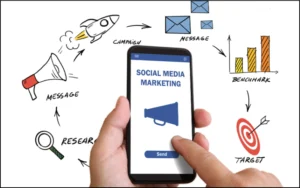We live in an era where the world can be brought closer than ever, thanks to the innovation and ease of digital technology. Yet, with the overload of information, how can your narrative stand out and make a difference? The answer lies in a robust social marketing campaign.
Table of Contents
This article aims to delve deep into the intricacies of a social marketing campaign. We explore what this concept entails, the step-by-step process to develop a compelling campaign, and some valuable tips to enhance its success. So, whether you’re new to the scene or looking to sharpen your skills, this guide has something in store for you!
What is a Social Marketing Campaign?
Social marketing fuses traditional marketing principles with social science to inspire behavior change that benefits individuals and communities. A social marketing campaign, therefore, is an organized effort to implement this approach and achieve specific social objectives.
A Trip Down Memory Lane
Interestingly, the roots of social marketing are embedded in public health, tracing back to the 1970s. The first representative campaign was aimed at family planning, which used ‘marketing mix’ principles (product, price, place, promotion) to change behaviour. Since then, its scope has broadened, encompassing various social issues, from environmental conservation to mental health awareness.
How to Develop a Social Marketing Campaign?
Developing a successful social marketing campaign demands strategic thinking. Here’s a roadmap to help you navigate:
Know your Audience
Deeply understanding and recognizing your target audience is paramount. You should consider their interests, preferences, barriers to change, and influencers.
Profile your Audience: Gathering demographic data and cultural information.
Identify Barriers and Facilitators: Determine what stops or encourages the change.
Explore Influencers: Recognize people, events, or contexts that influence beliefs and behaviours.
“Understanding your audience is not just about who they are but also about their journey and what drives their behaviour.” – Alex Birkett, Senior Growth Marketing Manager, HubSpot.
Develop a Campaign Strategy
Cohesive, insightful, and agile, these three words should define your campaign strategy. Incorporate the following elements:
Set SMART objectives: Ensure your goals are Specific, Measurable, Achievable, Relevant, and Time-bound.
Choose the apt Channels: Pick the right social media platforms where your target audience is active.
Plan Engaging Content: Use storytelling techniques to create content that resonates.
Measure, Adjust, Repeat
In the dynamic digital landscape, static strategies seldom work. Regularly assess your campaign’s impact, adjust according to insights, and keep refining it.
Magnifying Campaign Success: Valuable Tips
Some elements can enhance the success of your social marketing campaign:
Harness the Power of Storytelling
Storytelling holds immense power to connect, convince, and convert. Use personal testimonies, case studies, or anecdotes to make your message more relatable and compelling.
Encourage User-generated Content
Involving the audience in creating the content creates authenticity and increases engagement. Create campaigns that encourage users to generate content related to your cause, such as sharing personal experiences or spreading awareness.
Include a Clear Call to Action
Always aim to inspire action. Whether it is signing up for a webinar, joining a rally, or making a lifestyle change, leave no ambiguity about what you want the audience to do.
Conclusion
Social marketing campaigns are about influencing behaviours for social good. Understanding your audience, developing a compelling narrative, leveraging the right platforms, and regular assessment are keys to running a successful campaign. Remember, the prime goal is to instigate change, so every step should echo this noble intent. Are you ready to tell your story and make a difference?
Frequently Asked Questions About Social Marketing Campaigns
Q1: What is a social marketing campaign, and how does it differ from traditional marketing?
Answer: A social marketing campaign blends traditional marketing principles with social science to inspire behavior change that benefits individuals and communities. Unlike traditional marketing, which focuses on selling products or services, social marketing campaigns aim to promote social good and address various social issues.
Q2: What are the origins of social marketing, and how has it evolved over time?
Answer: The roots of social marketing can be traced back to the 1970s, primarily within the realm of public health. The first social marketing campaign focused on family planning and used marketing mix principles (product, price, place, promotion) to influence behavior change. Over the years, social marketing has expanded its scope, addressing diverse social issues, including environmental conservation and mental health awareness.
Q3: What are the key steps in developing a successful social marketing campaign?
Answer: Developing a successful social marketing campaign involves several crucial steps. The key ones include:
- Understanding Your Audience: Profiling your target audience, identifying barriers and facilitators to change, and recognizing influencers.
- Developing a Campaign Strategy: Setting SMART objectives, selecting appropriate communication channels, and planning engaging content.
- Measurement and Adaptation: Regularly assessing your campaign’s impact, adjusting strategies based on insights, and refining your approach.
Q4: What are SMART objectives, and why are they important in a social marketing campaign?
Answer: SMART objectives are Specific, Measurable, Achievable, Relevant, and Time-bound goals that provide a clear framework for your campaign. They are crucial because they ensure that your objectives are well-defined, trackable, realistic, aligned with your goals, and completed within a set timeframe, enhancing the effectiveness of your campaign.
Q5: How can storytelling be harnessed in a social marketing campaign?
Answer: Storytelling is a powerful tool in social marketing. It can be used to connect with the audience, persuade them, and encourage them to take action. Personal testimonies, case studies, and anecdotes make your message more relatable and compelling, driving engagement and creating a lasting impact.
Q6: What is user-generated content, and why is it important in social marketing campaigns?
Answer: User-generated content involves involving the audience in creating content related to your campaign. It is essential because it adds authenticity to your message and increases engagement. Encouraging users to share their personal experiences, stories, or awareness efforts related to your cause can enhance the credibility and reach of your campaign.
Q7: What is a “Call to Action” (CTA), and why is it vital in a social marketing campaign?
Answer: A Call to Action (CTA) is a clear and specific request for the audience to take action, such as signing up for a webinar, attending an event, or making a lifestyle change. CTAs are essential in social marketing campaigns because they guide the audience towards meaningful, goal-oriented actions, ensuring that the campaign’s objectives are met.
Q8: How can I measure the success of my social marketing campaign?
Answer: The success of a social marketing campaign can be measured through various metrics, such as website traffic, social media engagement, conversion rates, and surveys to assess behavior change. Regularly monitoring and analyzing these metrics provides insights into the campaign’s impact and effectiveness, enabling adjustments and refinements.
Q9: What is the ultimate goal of a social marketing campaign?
Answer: The primary goal of a social marketing campaign is to inspire behavior change for social good. It aims to address specific social issues, raise awareness, and encourage individuals and communities to take actions that contribute to positive change in society.
Q10: How can I get started with my own social marketing campaign?
Answer: To get started with a social marketing campaign, begin by thoroughly understanding your target audience, setting clear objectives, and developing a strategy that aligns with your campaign’s goals. Utilize the right communication channels, create engaging content, and regularly assess your campaign’s impact to make necessary adjustments. Remember that the key to a successful social marketing campaign is to influence behaviour and bring about positive social change.



